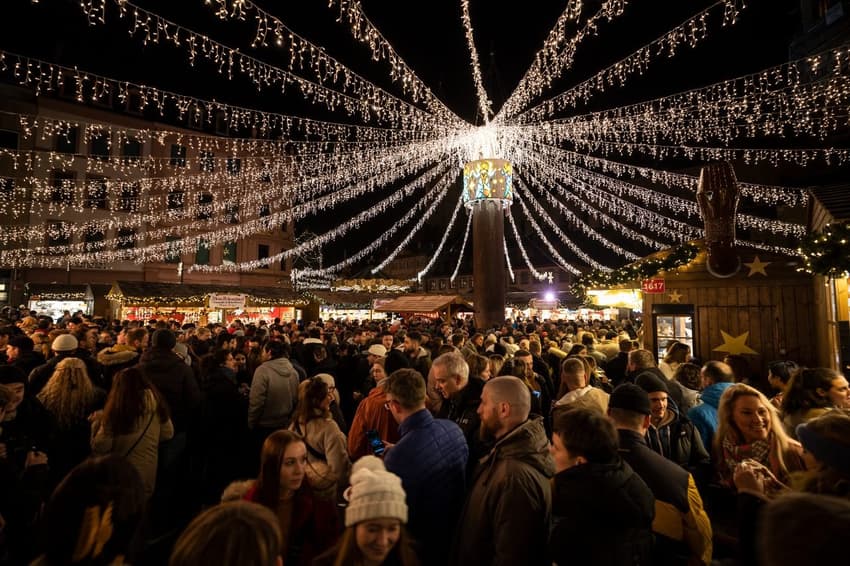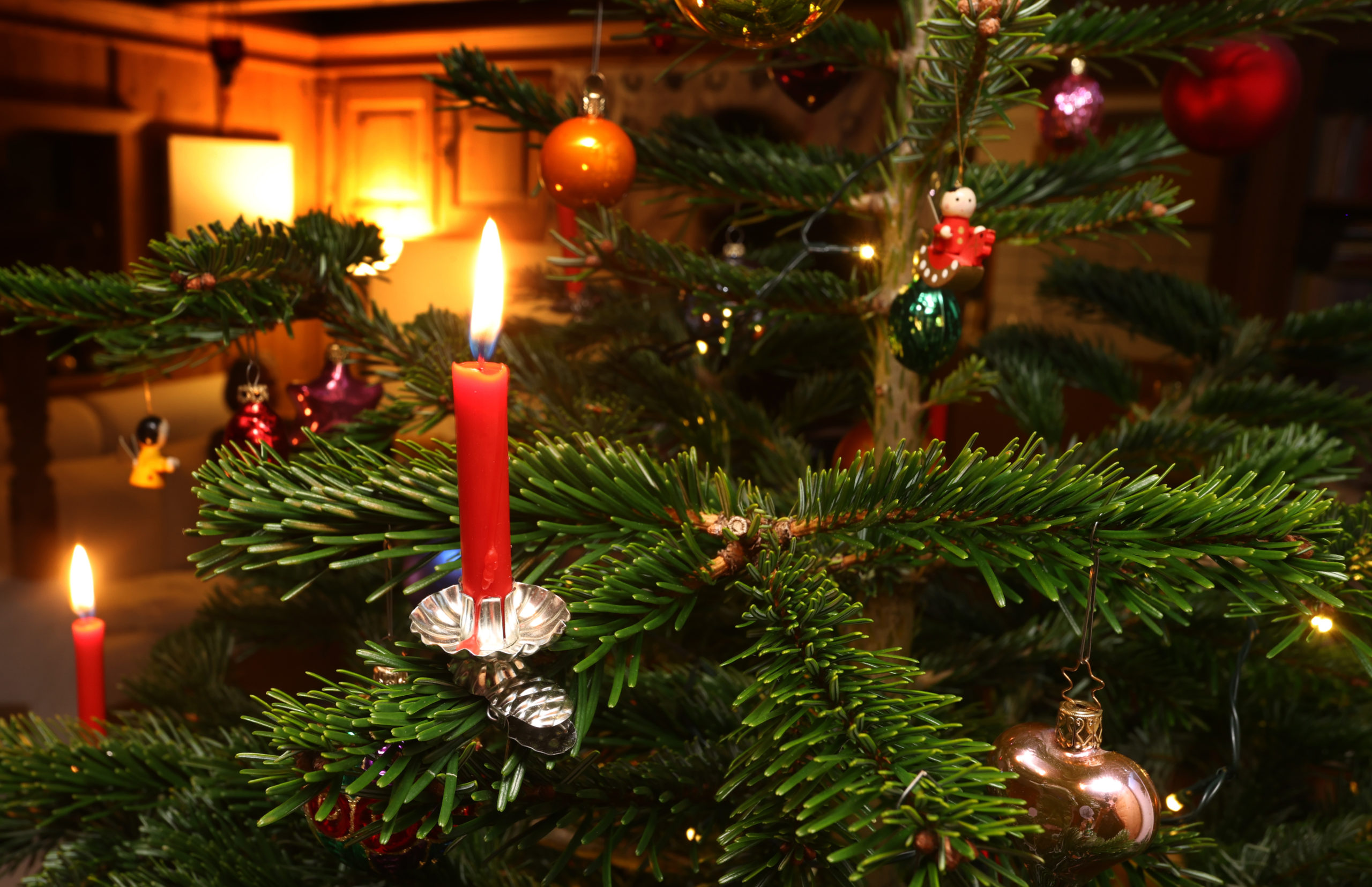9 things to know if you're visiting Germany in December

From Christmas markets to local holidays, here's what you need to know when visiting Germany this December.
If you’re travelling to (or around) Germany this December, here are a few key things to keep in mind, from Covid restrictions - or lack thereof - to the best Christmas cookies to scoff down guilt-free.
No more Covid restrictions for travel to Germany
Unlike the past two holiday seasons, no negative coronavirus test or vaccine card is required to enter Germany by plane, train, bus or other overland transport.
While Germany specifies that anyone coming from a virus-variant region faces restrictions such as quarantine and a test requirement, it currently does not list any countries that fall into this category.
Still a few nationwide rules
Until April 7th, 2023, Germany still has a few COVID rules in place. FFP2 masks are required in all long-distance public transport, with children ages 6-13 allowed to wear medical OP masks.
Those entering a hospital or care facility will need both an FFP2 mask and a COVID test. Anyone entering a doctor's office or other medical practice is also required to don an FFP2 mask.
READ ALSO: Will Germany get rid of masks in public transport?
Otherwise, each of Germany's 16 states has its own rules. While most still require masks on local public transport, a handful of states have voiced plans to drop the requirement soon.
Local holidays
While St. Nicholas Day on December 6th is not an official public holiday in Germany, it's celebrated by almost all families and for some is a bigger gift-giving occasion than Christmas itself.
READ ALSO: Why is Nikolaustag celebrated before Christmas itself?
December 24th and 31st are not official holidays, but most local employees give at least half of the day off as a gesture of goodwill.
Note that Germans open gifts on Christmas Eve (or Heiligabend, Holy Evening), usually after a special dinner with close family members. Then on the 25th, they gather for the first celebration day (Erster Feiertag) with extended family.
December 26th, which falls on a Monday this year, is a day off.

Candles decorate a Christmas tree in a living room. Photo: picture alliance/dpa | Karl-Josef Hildenbrand
Christmas markets are on again
After two winters of being fully or partially closed due to Covid restrictions, Germany's beloved Weihnachtsmärkte are now back in full swing. You will find them everywhere you go, from big cities to the tiniest of towns.
READ ALSO: Seven unmissable Christmas markets that open this week in Germany
While each has its own regional twist, you can sample staple treats such as Glühwein, or mulled wine, Lebkuchen (similar to gingerbread) and Stollen.
Everything is more expensive
While it’s dipped slightly, inflation in Germany is still 10 percent, which has led to price increases for everything from daily groceries to energy bills and dining out.
READ ALSO: EXPLAINED: 10 ways to save money on your groceries in Germany
Even the Christmas markets are more expensive this year due to higher prices for the Glühwein mugs. This means some markets in Berlin are charging almost €5 for the Pfand (deposit) for that first glass of mulled wine.
The same applies to ski resorts with hotels, lift tickets and restaurants all costing more this year.
It’s not too warm to ski
While Austria and Switzerland are the best known in the German speaking-world for their ski resorts, there are still many options in Germany starting at the beginning of December, especially in the south of the country. Like nearly everything else, though, expect some hefty price increases.
The top resorts in Germany include (but are not limited to) Arber, Alpsee-Grünten, Garmish-Partenkirchen, Winklmoosalm-Steinplatte, Oberstdorf, Winterberg and Oberjoch.
Advent countdown
Starting December 1st, Germans count down the days till Christmas with either a homemade or store-bought Adventkalendar. Traditionally, children open a small door each day to receive a tiny piece of chocolate, but in recent years it’s been possible to find calendars offering all sorts of small goodies, from a daily new flavour of tea to different dog treats.
READ ALSO: How do Germans celebrate Christmas?
Christmas treats
German restaurants have special menus for all seasons and occasions, and the holiday season is no exception. Check for a special ‘Weihnachtskarte’ (Christmas menu) with Gänsebraten (roasted geese) usually featured as the main specialty. And everywhere you go you can sample a batch of Weihnachtskekse (Christmas cookies), in all shapes and sizes. Many are baked by local schools or charities, so you can alleviate some guilt in chowing down on Zimtsterne (cinnamon stars) or Vanillekipferln (vanilla crescents).
Loud New Year's Eve celebrations
New Year's Eve (or Silvester) is notorious in Germany for firecracker chaos. While people in Germany were banned for two years from setting them off due to coronavirus restrictions, fireworks should be back in full swing this year - especially in the centre of big cities. So watch where you step, or if you’re lucky, look out of your window with a glass of champagne and enjoy the countdown till 2023.
Comments
See Also
If you’re travelling to (or around) Germany this December, here are a few key things to keep in mind, from Covid restrictions - or lack thereof - to the best Christmas cookies to scoff down guilt-free.
No more Covid restrictions for travel to Germany
Unlike the past two holiday seasons, no negative coronavirus test or vaccine card is required to enter Germany by plane, train, bus or other overland transport.
While Germany specifies that anyone coming from a virus-variant region faces restrictions such as quarantine and a test requirement, it currently does not list any countries that fall into this category.
Still a few nationwide rules
Until April 7th, 2023, Germany still has a few COVID rules in place. FFP2 masks are required in all long-distance public transport, with children ages 6-13 allowed to wear medical OP masks.
Those entering a hospital or care facility will need both an FFP2 mask and a COVID test. Anyone entering a doctor's office or other medical practice is also required to don an FFP2 mask.
READ ALSO: Will Germany get rid of masks in public transport?
Otherwise, each of Germany's 16 states has its own rules. While most still require masks on local public transport, a handful of states have voiced plans to drop the requirement soon.
Local holidays
While St. Nicholas Day on December 6th is not an official public holiday in Germany, it's celebrated by almost all families and for some is a bigger gift-giving occasion than Christmas itself.
READ ALSO: Why is Nikolaustag celebrated before Christmas itself?
December 24th and 31st are not official holidays, but most local employees give at least half of the day off as a gesture of goodwill.
Note that Germans open gifts on Christmas Eve (or Heiligabend, Holy Evening), usually after a special dinner with close family members. Then on the 25th, they gather for the first celebration day (Erster Feiertag) with extended family.
December 26th, which falls on a Monday this year, is a day off.

Christmas markets are on again
After two winters of being fully or partially closed due to Covid restrictions, Germany's beloved Weihnachtsmärkte are now back in full swing. You will find them everywhere you go, from big cities to the tiniest of towns.
READ ALSO: Seven unmissable Christmas markets that open this week in Germany
While each has its own regional twist, you can sample staple treats such as Glühwein, or mulled wine, Lebkuchen (similar to gingerbread) and Stollen.
Everything is more expensive
While it’s dipped slightly, inflation in Germany is still 10 percent, which has led to price increases for everything from daily groceries to energy bills and dining out.
READ ALSO: EXPLAINED: 10 ways to save money on your groceries in Germany
Even the Christmas markets are more expensive this year due to higher prices for the Glühwein mugs. This means some markets in Berlin are charging almost €5 for the Pfand (deposit) for that first glass of mulled wine.
The same applies to ski resorts with hotels, lift tickets and restaurants all costing more this year.
It’s not too warm to ski
While Austria and Switzerland are the best known in the German speaking-world for their ski resorts, there are still many options in Germany starting at the beginning of December, especially in the south of the country. Like nearly everything else, though, expect some hefty price increases.
The top resorts in Germany include (but are not limited to) Arber, Alpsee-Grünten, Garmish-Partenkirchen, Winklmoosalm-Steinplatte, Oberstdorf, Winterberg and Oberjoch.
Advent countdown
Starting December 1st, Germans count down the days till Christmas with either a homemade or store-bought Adventkalendar. Traditionally, children open a small door each day to receive a tiny piece of chocolate, but in recent years it’s been possible to find calendars offering all sorts of small goodies, from a daily new flavour of tea to different dog treats.
READ ALSO: How do Germans celebrate Christmas?
Christmas treats
German restaurants have special menus for all seasons and occasions, and the holiday season is no exception. Check for a special ‘Weihnachtskarte’ (Christmas menu) with Gänsebraten (roasted geese) usually featured as the main specialty. And everywhere you go you can sample a batch of Weihnachtskekse (Christmas cookies), in all shapes and sizes. Many are baked by local schools or charities, so you can alleviate some guilt in chowing down on Zimtsterne (cinnamon stars) or Vanillekipferln (vanilla crescents).
Loud New Year's Eve celebrations
New Year's Eve (or Silvester) is notorious in Germany for firecracker chaos. While people in Germany were banned for two years from setting them off due to coronavirus restrictions, fireworks should be back in full swing this year - especially in the centre of big cities. So watch where you step, or if you’re lucky, look out of your window with a glass of champagne and enjoy the countdown till 2023.
Join the conversation in our comments section below. Share your own views and experience and if you have a question or suggestion for our journalists then email us at [email protected].
Please keep comments civil, constructive and on topic – and make sure to read our terms of use before getting involved.
Please log in here to leave a comment.